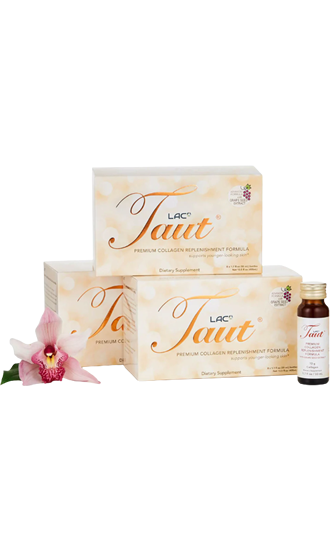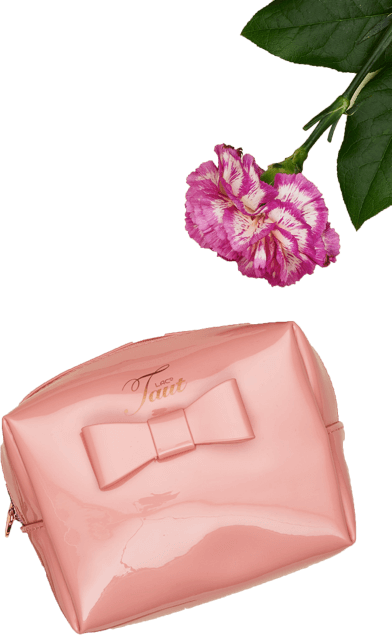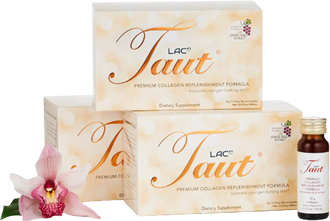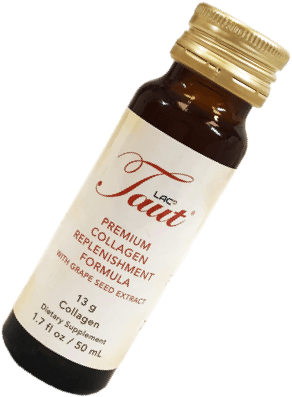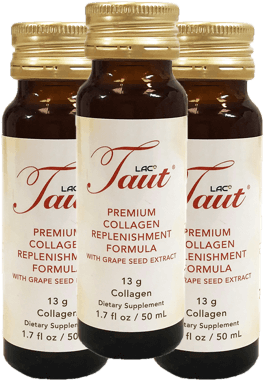What Is Elastin? Here’s the Definition & Function of Elastin for Skin & Body
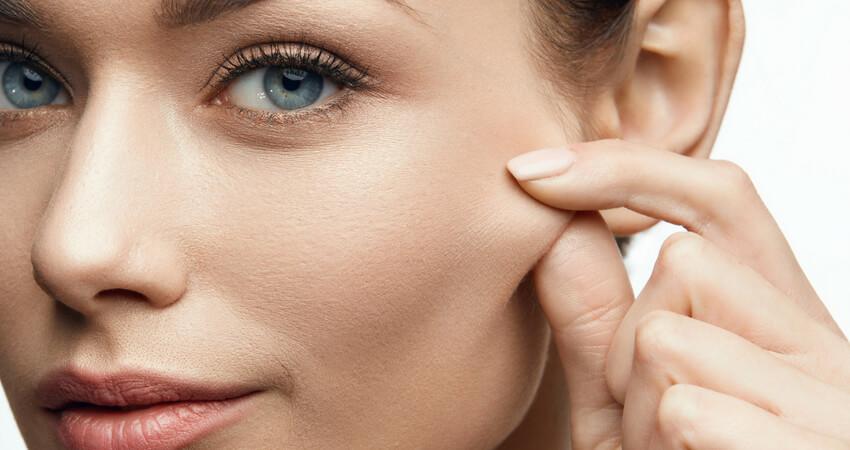
When it comes to , you’ve probably heard the word 'collagen' often and learned about the importance of what collagen does for your skin.
However, you might not have heard much about collagen's partner in crime, elastin. In fact, this little compound in your dermis could be the missing link to tight and bouncy skin.
So, what is elastin and why do we need it for healthy skin? As it turns out, elastin and collagen are two key proteins found in connective tissue that work together so you can maintain strong and firm skin.
While elastin and collagen are often mentioned together, there are many differences between these two proteins, as each of them serve a different function in your skin.
Let's take a deep dive into the underworkings of elastin, how it's different from collagen, and why it's important for you to support these two proteins with serious skin care.
Difference Between Collagen and Elastin
What Is Elastin? (Define Elastin)
You’ve probably heard beauty experts, dermatologists, and doctors discuss the importance of elastin in the dermis and various parts of the human body, but what is elastin exactly? Elastin is an extracellular matrix protein that is present in many organs and tissues in the human body, including the dermis, connective tissues (ligaments), lungs, and large blood vessels. What does that mean exactly? It means that elastin is essential to the function of our elastic tissue (any part of the human body that can stretch, bend, and bounce back into place).
Elastin contains two main components, which are determined by the ELN gene. Let’s take a look at how elastin functions in your tissues and why it’s important to support elastin for as long as possible.
- Elastin in the Lungs—The elastic fibers help the lungs expand and recoil as we breathe. The elastin functions to keep the lungs healthy and prevent them from hyperextending. However, various factors can cause the elastic fibers to become damaged. If elastin is damaged, the health of our lungs can be significantly impacted.
- Elastin in the Arteries—Our arteries are made up of cells and an extracellular matrix. Elastin is the main structural protein component of the extracellular matrix. When the elastic fibers in the extracellular matrix break down in our arteries, they release elastin-derived peptides which can negatively affect monocytes, connective tissue cells, and smooth muscle cells. These elastin-derived molecules can cause all kinds of diseases and conditions such as vascular disease, insulin resistance, and blood clots. 1, 2
- Elastin in Connective Tissue—A major component of our ligaments is elastic fibers. Without elastin, our connective tissue would not be able to recoil and get back to its natural shape after being stretched, bent, or contracted.
You can tell that elastin serves so many purposes throughout the human body, but what is the function of elastin when it comes to our skin and looks, exactly? This protein is what gives our dermis its structure. And, although this hydrophobic protein only makes up about 2% of the total protein in the dermis (unlike collagen that makes up more than 75%), it is crucial for providing the skin with resilience. Without elastin, our skin would be saggy, wrinkly, and have no elasticity. 3
What Is Collagen?
The emphasis in skincare and anti-aging products is often collagen, collagen, and more collagen—and rightly so. As we mentioned above, the majority of your skin is made up of collagen. You can think of this abundant protein which can also be found other connective tissue throughout the human body as the glue that holds your cells together.
Collagen provides the skin with plumpness and firmness. This is why many people look for treatments to increase the amount of collagen in their skin.
And, while laser treatments, dermal filler, and other procedures focus on replenishing collagen, very little is done to help support the health of our skin's elastin content.
After all, the skin is not complete without elastin; it's what gives the elastic and resilient qualities to our skin, but more on that later.
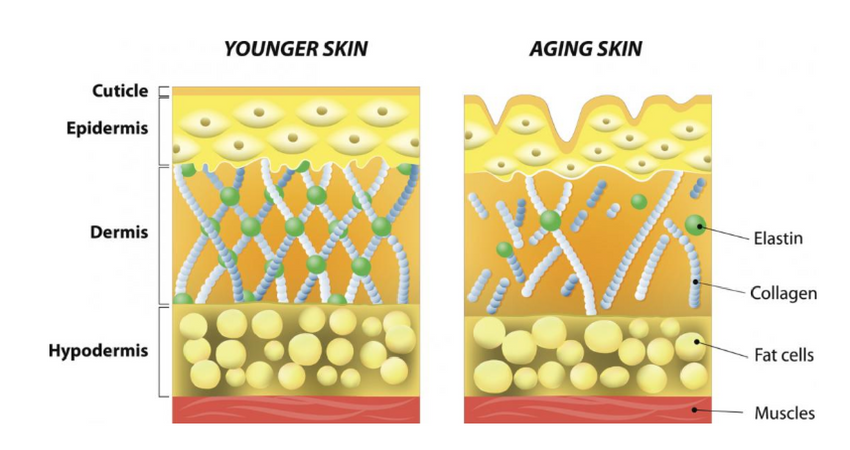
Overall, it should not come as a surprise that in order to maintain beautiful, youthful skin, supporting both elastin and collagen work hand in hand.
Collagen makes your skin look plump and provides rigidity, but elastin keeps it elastic and pliable. If you want to have firm, bouncy tight skin, you can’t have one without the other.
Where Does Elastin Come From? (Tropoelastin)
Buckle your seatbelts, we’re about to dive deep into the science behind the formation of elastin. Even though elastin is created in the many tissues throughout the human body, it doesn’t just appear out of thin air.
Elastin is built by an amino acid called “tropoelastin.” Tropoelastin is made by fibroblasts, the endothelial cells that also create collagen.
When tropoelastin proteins are cross-linked—or bonded together—in our many tissues, they create a sturdy extracellular matrix or complex otherwise known as "elastin."
What makes tropoelastin interesting is that the body cannot use it until it is cross-linked, or bonded into an elastin complex. However, once it becomes part of an elastin complex, it can finally be used in the elastic fibers of your tissues. Luckily, this process happens super fast. So, once tropoelastin amino acids are synthesized, or created, by our endothelial cells they are quickly cross-linked into an elastin complex.
Eventually, these complexes are what form elastic fibers. And, it’s this complex of bonded elastin that makes the elastic fibers in our connective tissues so malleable and durable.
See, you don’t have to have a Ph.D. in Biological Science to find tropoelastin and the formation of elastin interesting!
How Elastin Fibers Work
As the name suggests, elastin is a rubber-like protein that has elastic properties. And, as we’ve mentioned, an elastin protein is an essential component of the extracellular matrix in our connective tissues and organs.
Thanks to elastin fibers, our skin and other tissues are able to recoil to their original shape after being stretched. In fact, elastin is about 1000 times more flexible and pliable than its counterpart, collagen.
Elastin fibers can be stretched about to about 200% of their original length before they break. In contrast, a collagen fiber is more similar to a shoelace in that it is not extensible, though it is strong. Collagen fibers can only be stretched to about 110% of their original length.
But, as the elastin fibers in your skin start to break down and your skin loses elastin, it also loses its ability to bounce back like it once could.
Elastin fibers can break down as a result of sun exposure and UV damage, age, smoking, and stress on the skin, like sudden weight gain.
One of the best examples of broken elastin fibers is the appearance of stretch marks. Stretch marks, the lines that form on the skin during a growth spurt, pregnancy, or rapid weight loss or gain, are the result of excessive stretching of the skin. Eventually, when our skin is stretched for a long period of time, it can cause the elastin fibers in our dermis to rupture, leaving behind discolored streaks on our skin. Can you get rid of stretch marks? RenewSkin Inc. explains.
So, you can see why elastin is the missing link to bouncy, springy skin.
How Loss of & Lack of Elastin Impacts How You Look
Oculoplastic medical surgeon Steven Fagien, MD describes how lack of elastin impacts how we look. He explains that when your skin becomes wrinkled, saggy, and loses elasticity, it’s clearly missing the essential amino acids, collagen, and elastin. 4
Dr. Fagien compares elastin in the dermis to a leather seat. When the seat is new, it looks “tight, plump, and cushiony,” however, as time goes on, it starts to get worn out and look crinkly. Dr. Fagien continues to explain that lasers, a common treatment for wrinkles, are not able to fully improve the health of the dermis because they don’t address elastin, they can only improve the skin’s collagen molecules. 4
What Causes Elastin Production to Decline?
The human body produces elastin throughout childhood but stops producing elastin after puberty. Approximately 10% of the elastin in the human body is lost over a lifetime, which will cause wrinkles and sagging skin.
The loss of elastin in the skin is caused by both intrinsic and extrinsic aging.
Intrinsic aging takes place over the course of your life. Regardless of how well you care for your skin, your skin becomes thinner and less resilient over time. While intrinsic aging inevitably leads to wrinkle formation, it is when extrinsic aging occurs that the effects of aging skin are magnified.
Extrinsic aging is often the result of poor lifestyle habits and environmental damage. Not only does elastin biosynthesis slow down as you age, but existing elastic fibers in your skin also start to degenerate and damage accumulates in existing elastin. This means that your skin loses its ability to rebound.
That’s why aging skin looks wrinkly, saggy, and loose. As Dr. Fagien explains above, it’s similar to old leather furniture or car seats. While the leather seating may have looked plump and smooth in its early years, it starts to get thin, loose, and crinkly over time.
And, as we’ve mentioned above, sun damage exacerbates the degradation of elastin, though most elastin fibers in the skin appear abnormal in the skin after you reach about 70 years of age, even if the skin has been well protected from the sun over the years. Certain lifestyle, genetic, and health factors can cause your skin to lose elasticity even before you reach your 70's.
The more elastin and collagen that your skin loses, the more wrinkles and fine lines will appear on your skin. That’s why it’s so important to adjust your habits and skincare regimen to boost elastin and collagen levels in your skin.
How to Prevent & Minimize Elastin Loss and Damage
1. Protect Against UV Rays
Ultraviolet (UV) light damages elastic fibers over time. As elastin fibers degenerate, the skin starts to sag and stretch out, and it eventually becomes unable to bounce back.
While you won’t notice sun damage when you’re young, you’ll definitely see the effects on your skin as you age. According to a study published in the Journal of Investigative Dermatology, long-term UV radiation leads to wrinkle formation that is accompanied by decreases in skin elasticity and the curling of elastin fibers in the dermis.
That's why you should protect your skin by wearing sunscreen with SPF 30 or higher every day to keep your skin looking its best and prevent elastin degradation from taking place. You should also avoid exposure to pollution, cigarettes, alcohol, drugs, pesticides, toxins, and stress, all of which lead to protein loss (elastin and collagen).
Additionally, you can supplement your skin with powerful antioxidants that will help protect your dermis from free-radical damage. A supplement, like our LAC Masquelier French Pine Bark Extract OPC, promotes supple and healthy blood vessels because it is packed with the powerful antioxidant, french pine bark extract.
How can french pine bark extract help support the multiple functions of our blood vessels and support our skin? Well, our blood vessels are essential to supplying our muscles, organs, and connective tissue—including the connective tissue in our dermis—with blood and other nutrients along with getting rid of waste.
This is especially important because as we age and are exposed to free radicals, the quality of our nutrient delivery system (blood vessels) starts to decline.
What french pine bark extract does is help stimulate blood flow and ensure that harmful toxins and waste continue to flow out of our bloodstream. This lessens our chances of experiencing harmful free radical build-up and makes sure vital nutrients are delivered where they are needed most. Additionally, supplementing with french pine bark extract helps support and protect the collagen fibers in our skin from free-radical damage. In fact, this antioxidant has been clinically proven to slow the breakdown of skin elastin and collagen, reducing the appearance of the most common signs of aging.
Just 1 to 2 of these vegan, gluten-free, and GMO-free tablets per day can help support a more youthful appearance while providing healing properties throughout the body’s many tissues.
2. Minimize and Avoid Stress
If you are constantly under stress, it can lead to the overproduction of the hormone cortisol, which makes it difficult for your skin to repair itself and continue to produce elastin and collagen. Be sure to get exercise, plenty of sleep, and avoid stress to reduce cortisol levels.
Exercise is also a great way to get rid of flabby arms, and firm and tone, which can also help prevent sagging skin due to gradual loss in elastin.
Along with working out, it’s important to give yourself rest days. What better way to let your muscles relax and de-stress than an at-home spa day with our Taut Collagen Face Mask?
This luxurious sheet mask is infused with hydrolyzed collagen peptides that have been broken down into small, nano-sized molecules. These tiny molecules are small enough to penetrate your pores to boost the development of new collagen molecules in the dermis.
The mask also contains hyaluronic acid, which is a natural, powerful ‘moisture magnet’ that deeply nourishes the skin, and squalene from olives which can help restore our skin’s natural oil levels and deeply hydrate the skin.
Of course, this collagen mask wouldn’t be complete without vitamin C, a co-factor of collagen. Vitamin C is essential to the development of collagen within the dermis and it also functions as an antioxidant to fight free radicals and prevent damage, promoting healthy, elastic skin.
This sheet mask is the perfect solution when you need instant rejuvenation and red carpet radiance in less than 20 minutes. After just one application, you’ll notice more hydrated, moist, and glowing skin.
3. Limit Sugar Intake
Less sugar usually equals better skin. Sugar consumption is a leading cause of premature aging. Sugary snacks might taste delicious, but the extra sugar in your bloodstream is detrimental to the proteins in your skin (hint: elastin and collagen).
Also, avoid bad sugar that can cause more harm than good.
Simple carbohydrates, including refined sugar and white bread, cause insulin levels to spike and create inflammation. The inflammation produces enzymes that break down elastin and collagen amino acids. This makes your dermis look dull and wrinkled.
Sugar molecules attach to the elastin and collagen fibers in your dermis, in a process known as 'glycation'. This leads to the formation of glycation end products, which cause the protein fibers to become stiff, weak, and discolored. The presence of glycation end products also makes your dermis more susceptible to the free radicals in UV rays and pollutants like cigarette smoke.
Having trouble kicking your sugar habit? Consider integrating a stevia-sweetened, collagen drink into your day, like our Taut Collagen Powder. This collagen peptides powder helps you get over your sugar cravings while rejuvenating your skin. Each sachet contains 1,500mg of marine collagen peptides, hyaluronic acid, and grape seed extract to strengthen your skin’s natural collagen and elastin for healthy, more youthful skin.
Unlike most collagen powders, this collagen powder is particularly effective because of its quick-dissolving formula. The powder dissolves in your mouth seconds after hitting your tongue to provide a better and more efficient delivery system for optimal results. Plus, all of the ingredients combined give your skin the nutrients it needs to replenish the natural collagen, elastin, and hyaluronic acid in your dermis for a more supple, beautiful, and radiant complexion.
How to Increase Elastin in the Dermis
Aging and glycation are facts of life, but that doesn’t mean there is nothing you can do about it. Diet, skincare, and lifestyle factors can and do make a difference.
Elastin is sometimes present in creams and serums, but as an ingredient in topical products, elastin cannot make it past your dermis’s protective layer and take hold at the cellular level (within the dermis). However, you can take elastin peptides orally as this is proven to combat the signs of aging.
Supplement Your Skin with Elastin Peptides
What Are Elastin Peptides?
Marine elastin peptides consist of purified, hydrolyzed marine elastin. They are extracted from fish skin via a process called 'enzymatic hydrolysis.' Marine elastin molecules have a low molecular weight—approximately 1,400 Daltons (Da)—making them water-soluble, fully digestible, and highly bioavailable.
Elastin peptide supplements protect elastic fibers by inhibiting elastase, an enzyme that attacks elastin. Marine elastin peptides also promote the biosynthesis of new elastin fibers. Additionally, elastin peptide supplements boost the synthesis of collagen fibers and stimulate skin cell proliferation.
Elastin Peptides (Amino Acids) Clinically Proven to Improve Skin Elasticity
In a recent double-blind, placebo-controlled clinical study published in 2015, researchers demonstrated that ingestion of elastin peptides significantly promoted elastin synthesis in the dermis layer of healthy women volunteers, and more notably, the women in the active group saw significantly improved skin elasticity (compared to those in the placebo group) after 4 weeks. 4
How Much Elastin Do You Need to See Results?
The subjects in the clinical trial were given 30mg of elastin peptides per day for 4 weeks. Lower daily doses may also be effective.
For Best Results: Supplement with Both Collagen & Elastin
Build your elastin and collagen from the inside with Taut Premium Collagen Advanced Formula Drink. One tiny bottle of Taut Premium Collagen contains 13,000mg of marine collagen peptides and 30mg of marine elastin. Taut Premium Collagen contains a powerful formula with 7 key active ingredients that work together to boost and restore elastin, collagen fibers, and hyaluronic acid in the dermis.
Due to its liquid form, Taut Premium Collagen is optimized to deliver elastin peptides and hydrolyzed collagen peptides to the bloodstream quickly and promote the development of new collagen within the dermis.
Studies have shown that taking 10,000mg of hydrolyzed collagen per day for eight weeks increases the density of the dermis, decreases wrinkle formation, and improves skin smoothness and hydration.
Taut Premium Collagen Advanced Formula has been shown to visibly reduce signs of aging, promote a fuller, firmer, youthful, radiant complexion in as little as 3 weeks.
Continual use of collagen supplements is a natural way you can rebuild the elastin and collagen within the dermis to keep your skin elastic, healthy, and youthful for years to come. We’ve put together our Taut Premium Collagen Intense Transformation + Taut Bright program for exactly that reason. This program comes with 3 boxes of our Taut Premium Collagen Drinks along with 1 box of our super antioxidant-packed Taut Bright skin supplement, which has been proven by science to illuminate and brighten the skin. It has shown to be particularly effective when it comes to lightening age spots and hyperpigmentation.
How does it work? This supplement contains powerful active ingredients and antioxidants like L-Glutathione, L-Cysteine, olive leaf extract, grape seed extract, and artichoke leaf extract, which protect against cellular damage caused by free radicals. These ingredients inhibit excess melanin production in the skin to reduce the look of age spots and dark spots, naturally lightening the skin.
While a topical solution can only treat the symptoms on our skin temporarily, this transformation program is designed to address the root of the problem from the inside for results that you can see on the outside. After 24 days, you will notice visibly reduced fine lines, noticeably fuller and thicker skin, toned sagging skin, fewer age spots and acne scars, and a more youthful and beautiful glow.
Our Customers Share Their Results with Taut Collagen Advanced Formula
Testimony from an Older Woman
"As a 68 yr old I have tried innumerable serums, creams, and injections over the years with minimal results - but after trying Taut daily for a month I can tell a difference in my skin tone ( plumper), skin sagging (firmer), and wrinkles (diminished particularly under the eyes). I plan on continuing using Taut for a long long time."
Ease
"In the last few years, there has been a visible change in the elasticity of my skin. The results of using taut have been remarkably exciting. I have powder collagen products, yet find myself forgetting to mix up or add to various drinks and food. What I love about this product, is the ease and simplicity. I put a bottle on the nightstand and take before falling g asleep. Have seen the results and appreciate the quality of this collagen product."
Hitting 60 feeling 30!
Sixty is the here! Anti aging has become my new hobby in the past 5 yrs and I will do MOST anything to improve my skin!! For yrs I have loaded my skin up with topical collagen creams but only recently learned of "hydrolyzed collagen" that we should be ingesting for beautiful skin! I did my researched and I am still mesmerized by Taut's quality products! I am on my second order of the 24 day premium replenishment formula and I can honestly say I love it!! My skin has a plumper youthful glow and best of all my crappie eyelids have diminished at least 50%!! Also LOVE the taste! Look forward to guzzling my "wrinkle juice" right before bed! Pricey but worth every dollar! Received my adorable tote w first order! So cute! CaN't wait to see what Taut comes up with next!!
Want to find out which transformation program is right for you and your skin? Take our skincare quiz!
References

